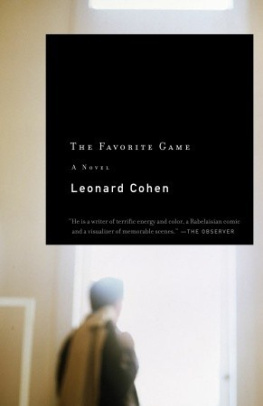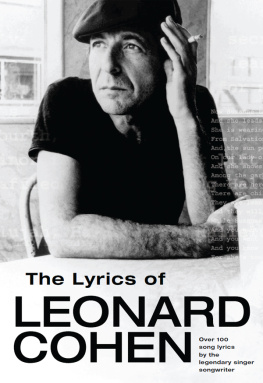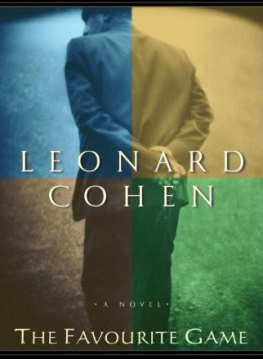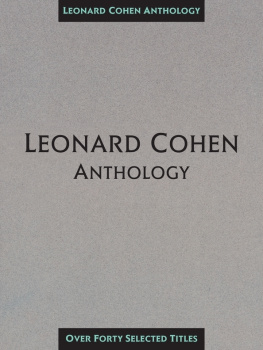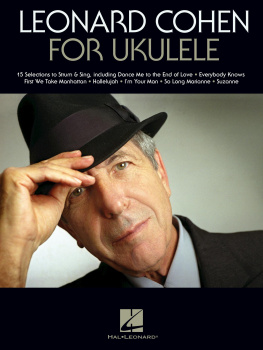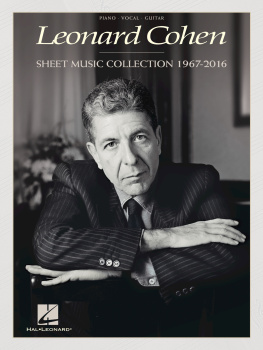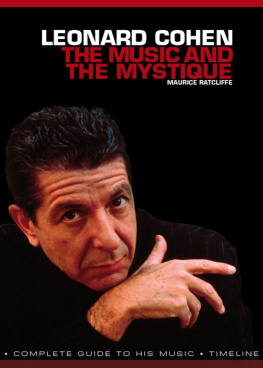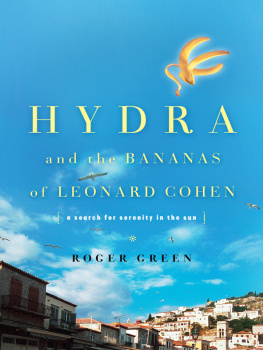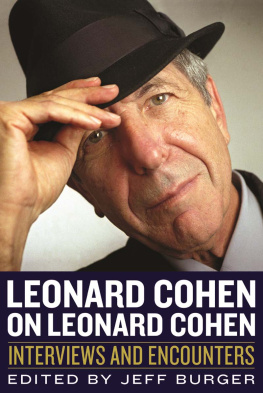The Favourite Game
by
Leonard Cohen
LEONARD COHEN was born in Montreal, Quebec, in 1934. He received his B.A. (1955) from McGill University and pursued graduate studies in English at Columbia University. Soon thereafter, he returned to Montreal and worked in his familys clothing business while he continued to write poetry.
The year after he graduated from McGill, Cohen published his first volume of poetry, Let Us Compare Mythologies, where he brought together his Jewish heritage with classical and Christian myths in lyrical poems that juxtapose religion with sensuality. Although later volumes would adopt a darker, more ironic tone, his poetry continues to explore the individuals quest for love and spiritual transcendence.
In 1961 Cohen left for England, where he wrote his first novel, The Favourite Game (1963), a semiautobiographical account of a Montreal Jewish boys discovery of his vocation as a poet. During the sixties he achieved national and international acclaim as a composer-singer.
Cohen has lived intermittently in England, on the Greek Island of Hydra, in California, and in New York, although he frequently returns to Montreal, which he still considers to be home.
The following dedication appeared in the original edition: To my mother
As the mist leaves no scarOn the dark green hill,So my body leaves no scarOn you, nor ever will.When wind and hawk encounter,What remains to keep?So you and I encounter,Then turn, then fall to sleep.As many nights endureWithout a moon or star,So will we endureWhen one is gone and far.
Book I
1
BREAVMAN KNOWS a girl named Shell whose ears were pierced so she could wear the long filigree earrings. The punctures festered and now she has a tiny scar in each earlobe.
He discovered them behind her hair.
A bullet broke into the flesh of his fathers arm as he rose out of a trench. It comforts a man with coronary thrombosis to bear a wound taken in combat.
On the right temple Breavman has a scar which Krantz bestowed with a shovel. Trouble over a snowman. Krantz wanted to use clinkers as eyes. Breavman was and still is against the use of foreign materials in the decoration of snowmen. No woollen mufflers, hats, spectacles. In the same vein he does not approve of inserting carrots in the mouths of carved pumpkins or pinning on cucumber ears.
His mother regarded her whole body as a scar grown over some earlier perfection which she sought in mirrors and windows and hub-caps.
Children show scars like medals. Lovers use them as secrets to reveal. A scar is what happens when the word is made flesh.
It is easy to display a wound, the proud scars of combat. It is hard to show a pimple.
2
Breavmans young mother hunted wrinkles with two hands and a magnifying mirror.
When she found one she consulted a fortress of oils and creams arrayed on a glass tray and she sighed. Without faith the wrinkle was anointed.
This isnt my face, not my real face.
Where is your real face, Mother?
Look at me. Is this what I look like?
Where is it, wheres your real face?
I dont know, in Russia, when I was a girl.
He pulled the huge atlas out of the shelf and fell with it. He sifted pages like a goldminer until he found it, the whole of Russia, pale and vast. He kneeled over the distances until his eyes blurred and he made the lakes and rivers and names become an incredible face, dim and beautiful and easily lost.
The maid had to drag him to supper. A ladys face floated over the silver and the food.
3
His father lived mostly in bed or a tent in the hospital. When he was up and walking he lied.
He took his cane without the silver band and led his son over Mount Royal. Here was the ancient crater. Two iron and stone cannon rested in the gentle grassy scoop which was once a pit of boiling lava. Breavman wanted to dwell on the violence.
Well come back here when Im better.
One lie.
Breavman learned to pat the noses of horses tethered beside the Chalet, how to offer them sugar cubes from a flat palm.
One day well go riding.
But you can hardly breathe.
His father collapsed that evening over his map of flags on which he plotted the war, fumbling for the capsules to break and inhale.
4
Here is a movie filled with the bodies of his family.
His father aims the camera at his uncles, tall and serious, boutonnieres in their dark lapels, who walk too close and enter into blurdom.
Their wives look formal and sad. His mother steps back, urging aunts to get into the picture. At the back of the screen her smile and shoulders go limp. She thinks she is out of focus.
Breavman stops the film to study her and her face is eaten by a spreading orange-rimmed stain as the film melts.
His grandmother sits in the shadows of the stone balcony and aunts present her with babies. A silver tea-set glows richly in early Technicolor.
His grandfather reviews a line of children but is stopped in the midst of an approving nod and ravaged by a technical orange flame.
Breavman is mutilating the film in his efforts at history.
Breavman and his cousins fight small gentlemanly battles.
The girls curtsy. All the children are invited to leap one at a time across the flagstone path.
A gardener is led shy and grateful into the sunlight to be preserved with his betters.
A battalion of wives is squeezed abreast, is decimated by the edge of the screen. His mother is one of the first to go.
Suddenly the picture is shoes and blurred grass as his father staggers under another attack.
Help!
Coils of celluloid are burning around his feet. He dances until he is saved by Nursie and the maid and punished by his mother.
The movie runs night and day. Be careful, blood, be careful.
5
The Breavmans founded and presided over most of the institutions which make the Montreal Jewish community one of the most powerful in the world today.
The joke around the city is: The Jews are the conscience of the world and the Breavmans are the conscience of the Jews.
And I am the conscience of the Breavmans, adds Lawrence Breavman. Actually we are the only Jews left; that is, super-Christians, first citizens with cut prongs.
The feeling today, if anyone troubles himself to articulate it, is that the Breavmans are in a decline. Be careful
Lawrence Breavman warns his executive cousins, or your children will speak with accents.
Ten years ago Breavman compiled the Code of Breavman: We are Victorian gentlemen of Hebraic persuasion.
We cannot be positive, but we are fairly certain that any other Jews with money got it on the black market.
We do not wish to join Christian clubs or weaken our blood through inter-marriage. We wish to be regarded as peers, united by class, education, power, differentiated by home rituals.
We refuse to pass the circumcision line.
We were civilized first and drink less, you lousy bunch of bloodthirsty drunks.
6
A rat is more alive than a turtle.
A turtle is slow, cold, mechanical, nearly a toy, a shell with legs. Their deaths didnt count. But a white rat is quick and warm in its envelope of skin.
Krantz kept his in an empty radio. Breavman kept his in a deep honey tin. Krantz went away for the holidays and asked Breavman to take care of his. Breavman dropped it in with his.
Feeding rats is work. You have to go down to the basement.
He forgot for a while. Soon he didnt want to think about the honey tin and avoided the basement stairs.
He went down at last and there was an awful smell coming from the tin. He wished it were still full of honey. He looked inside and one rat had eaten most of the stomach of the other rat. He didnt care which was his. The alive rat jumped at him and then he knew it was crazy.

